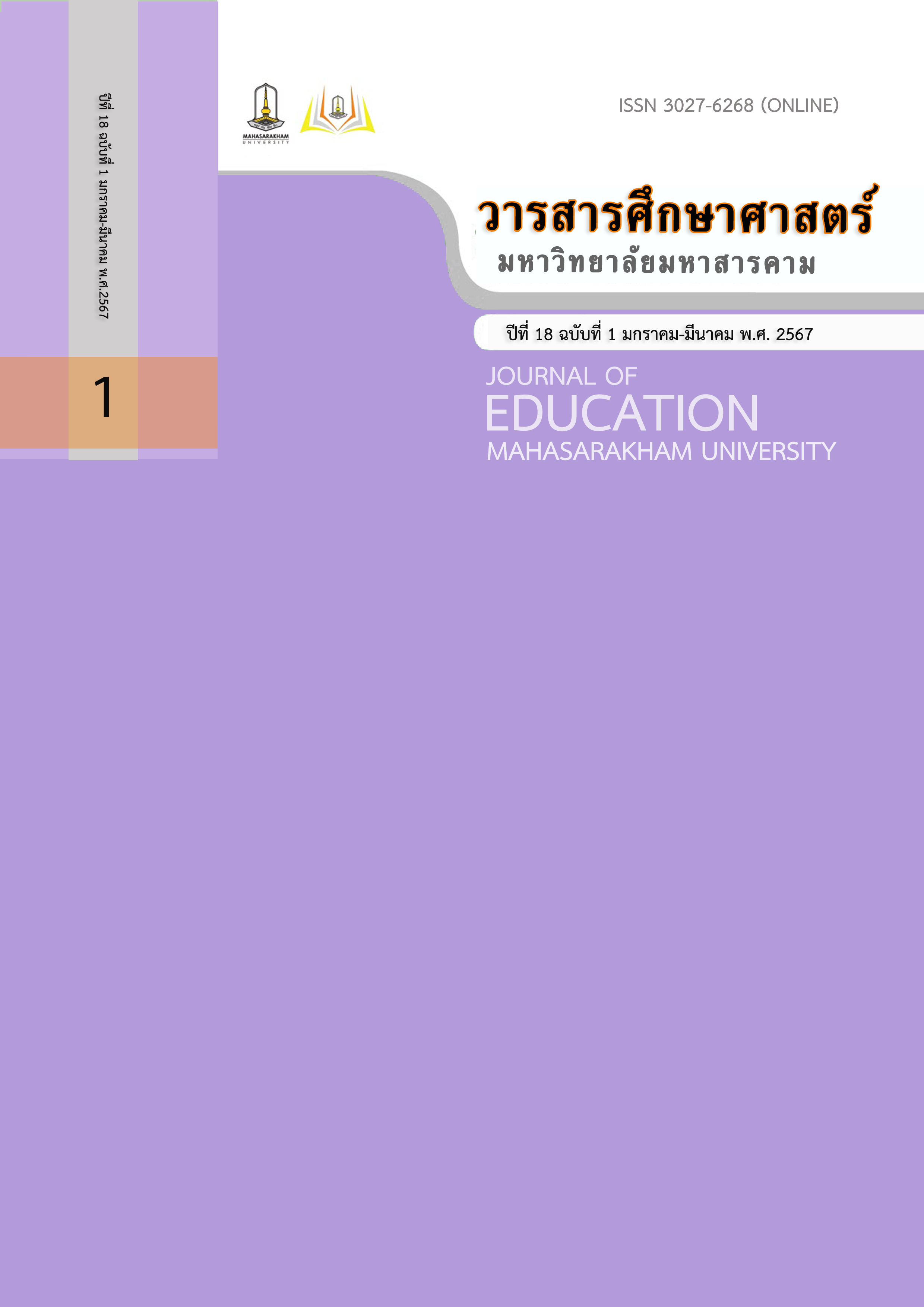The Argument-Driven Inquiry Learning on Scientific Reasoning Ability and Learning Achievement of Grade 8 Students
Main Article Content
Abstract
The purposes of this study were to 1) compare the scientific reasoning abilities of grade 8 students before and after 2) compare learning achievements in science with percentage of criteria at 70 and 3) study satisfaction towards the argument-driven inquiry learning. The participants were 40 students who studied in grade 8 class 4 semester 2, academic year 2022, Kaengkhrowittaya School using cluster random sampling technique. The research instruments used in this study consisted of 1) 9 learning management plans of 14 hours, 2) scientific reasoning ability test, which was a subjective test of 10 questions, 5-question pre-test, and 5-question post-test, 3) the achievement test, which was a 30-question multiple-choice test, and 4) 20 questions of satisfaction test with a 5-level estimation scale. The data were analyzed with the use of basic statistical methods, including percentage, mean (), standard deviation (S.D.), t-test dependent and one samples t-test.
The research findings were as follows: 1) the scientific reasoning abilities of grade 8 students after using the argument-driven inquiry learning were higher than before with the difference at the .05 level of significance 2) students’ learning achievement was at the average of 22.20 from total score of 30 reaching percentage of 74 higher than the criteria at 70 at 0.5 level of significance, and 3) grade 8 students were satisfied with the argument-driven inquiry learning with the highest level of satisfaction (=4.81,S.D.=0.40).
Downloads
Article Details

This work is licensed under a Creative Commons Attribution-NonCommercial-NoDerivatives 4.0 International License.
References
กุลวรรธน์ อินทะอุด. (2561). รูปแบบการจัดการเรียนรู้แบบสืบเสาะที่ขับเคลื่อนด้วยกลวิธีการโต้แย้งเพื่องส่งเสริมการให้เหตุผลเชิงวิทยาศาสตร์ของนักเรียนระดับมัธยมศึกษาปีที่ 5 เรื่องแสงและทัศนอุปกรณ์. วิทยานิพนธ์ กศ.ม. สาขาวิชาฟิสิกส์ มหาวิทยาลัยนเรศวร.
ชนัญธิดา สุริโย. (2562). การพัฒนากิจกรรมการเรียนรู้วิทยาศาสตร์ที่ส่งเสริมความสามารถในการให้เหตุผลเชิงวิทยาศาสตร์ ของนักเรียนชั้นมัธยมศึกษาปีที่ 4. วิทยานิพนธ์ ค.ม. สาขาวิชาหลักสูตรและการสอน มหาวิทยาลัยราชภัฏมหาสารคาม.
ทิศนา แขมมณี. (2563). ศาสตร์การสอน: องค์ความรู้เพื่อการจัดกระบวนการเรียนรู้ที่มีประสิทธิภาพ (พิมพ์ครั้งที่ 24). กรุงเทพฯ: สำนักพิมพ์จุฬาลงกรณ์มหาวิทยาลัย.
บุญชม ศรีสะอาด. (2560). การวิจัยเบื้องต้น (พิมพ์ครั้งที่ 10). กรุงเทพฯ: สุวีริยาสาส์น.
ปัณณพร จันชัยภูมิ. (2563). ผลของหน่วยการเรียนรู้ด้วยรูปแบบการสืบเสาะที่ขับเคลื่อนด้วยกลวิธีการโต้แย้ง ที่มีต่อความสามารถในการให้เหตุผลเชิงวิทยาศาสตร์ ของนักเรียนระดับชั้นมัธยมศึกษาตอนปลาย. วิทยานิพนธ์ กศ.ม. สาขาวิชาวิทยาศาสตรศึกษา มหาวิทยาลัยศรีนครินทรวิโรฒ.
ฝ่ายวิชาการโรงเรียนแก้งคร้อวิทยา. (2564). รายงานผลสัมฤทธิ์ทางการเรียน โรงเรียนแก้งคร้อวิทยา. ชัยภูมิ: ฝ่ายวิชาการ โรงเรียนแก้งคร้อวิทยา.
รัตนวลี สราญบุรุษ. (2565). การจัดกิจกรรมการเรียนรู้โดยใช้รูปแบบการเรียนการสอนแบบสืบเสาะร่วมกับกลวิธีโต้แย้งที่ส่งเสริมความสามารถในการสร้างคำอธิบายทางวิทยาศาสตร์ และผลสัมฤทธิ์ทางการเรียน เรื่อง กรด-เบส ของนักเรียนชั้นมัธยมศึกษาปีที่ 5. วิทยานิพนธ์ กศ.ม. สาขาวิชาหลักสูตรและการสอน มหาวิทยาลัยมหาสารคาม.
โรงเรียนแก้งคร้อวิทยา. (2564). รายงานผลการทดสอบระดับชาติขั้นพื้นฐาน (O-NET) โรงเรียนแก้งคร้อวิทยา. ชัยภูมิ: ฝ่ายวิชาการ โรงเรียนแก้งคร้อวิทยา.
สถาบันส่งเสริมการสอนวิทยาศาสตร์และเทคโนโลยี. (2554). ผลการประเมิน PISA 2009 การอ่าน คณิตศาสตร์และวิทยาศาสตร์. กรุงเทพฯ: สถาบันส่งเสริมการสอนวิทยาศาสตร์และเทคโนโลยี.
________. (2560). การจัดสาระการเรียนรู้กลุ่มวิทยาศาสตร์หลักสูตรการศึกษาขั้นพื้นฐาน. กรุงเทพฯ: สถาบันส่งเสริมการสอนวิทยาศาสตร์และเทคโนโลยี.
________. (2564). ผลการประเมิน PISA 2018 การอ่าน คณิตศาสตร์ และวิทยาศาสตร์. กรุงเทพฯ: สถาบันส่งเสริมการสอนวิทยาศาสตร์และเทคโนโลยี.
สมศักดิ์ เอี่ยมคงสี. (2561). การจัดการห้องเรียนในศตวรรษที่ 21. กรุงเทพฯ: ทริปเพิ้ล เอ็ดดูเคชั่น.
สำนักงานเลขาธิการสภาการศึกษา. (2562). กรอบสมรรถนะหลักผู้เรียนระดับการศึกษาขั้นพื้นฐาน. กรุงเทพฯ: สกศ.
Fakhriyah, F., Rusilowati, A., & Susilaningsih, E. (2021). Argument-Driven Inquiry Learning Model: A Systematic Review. International Journal of Research in Education and Science, 7(3), 767-784.
Kuhn, D. (1993). Science as argument: Implications for teaching and learning scientific thinking. Science education, 77(3), 319-337.
Lawson, A. E. (2009). Basic Inferences of Scientific Reasoning, Argumentation, and Discovery. Journal of Research in Science Teaching, 94, 336-364.
Osborne, J., Erduran, S., Simon, S., & Monk, M. (2001). Enhancing the quality of argument in school science. School science review, 82(301), 63-70.
Sampson, V., Walker, J. P., Grooms, J., Anderson, B., & Zimmerman, C. O. (2011). Argument-driven inquiry as a way to help students learn how to participate in scientific argumentation and craft written arguments: An exploratory study. Science Education, 95(2), 217-257.


